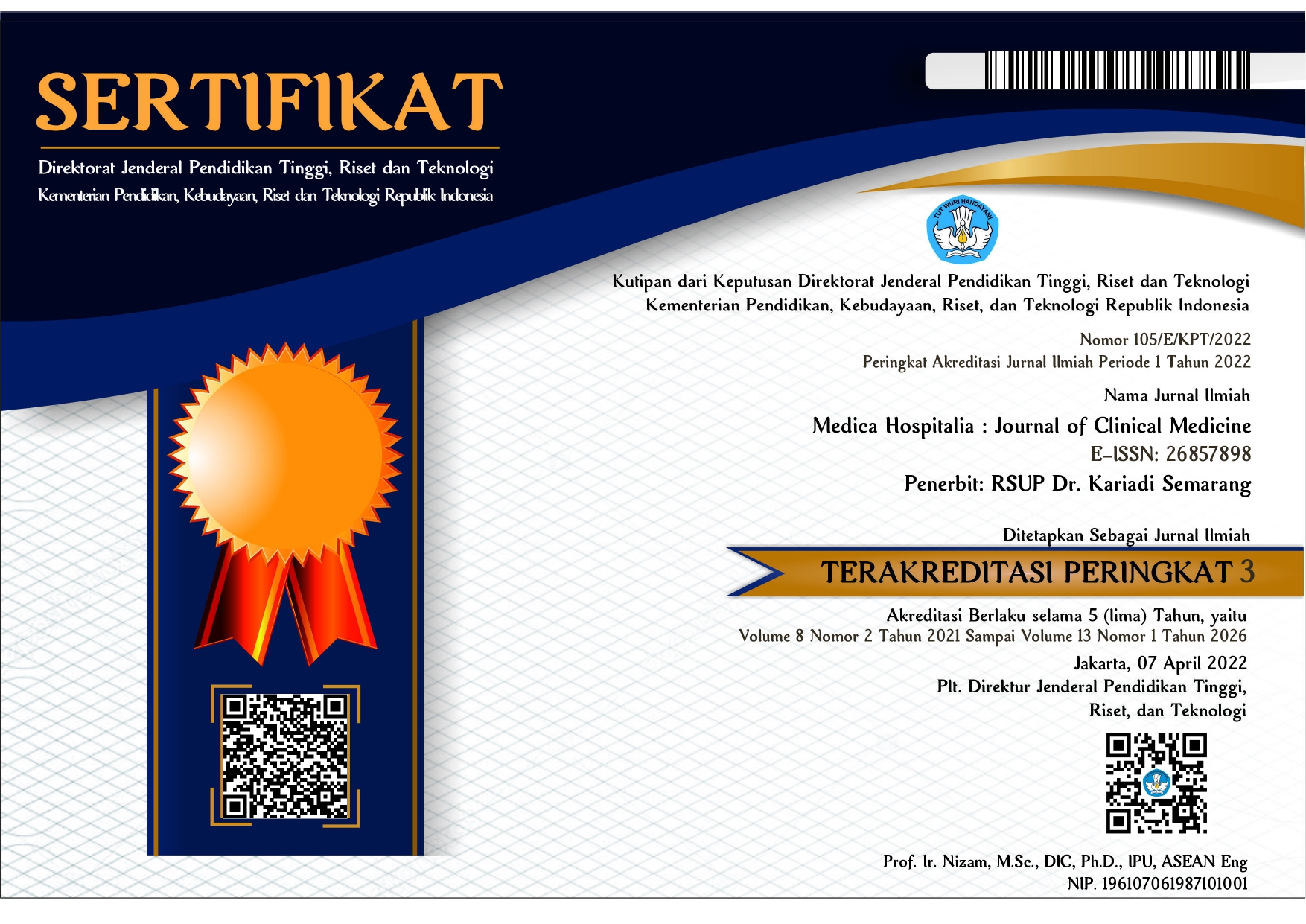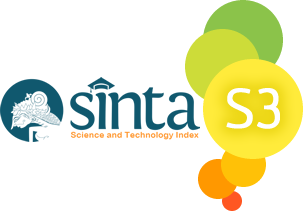Serial Case: Infarct Stroke In Covid 19 Patients
DOI:
https://doi.org/10.36408/mhjcm.v10i1.744Keywords:
Stroke infarction, COVID 19, SARS-CoV-2, Hypercoagulation, VasculopathyAbstract
Introduction: SARS-CoV-2 has been reported to cause various neurological symptoms including stroke. SARS-CoV-2 infection causes the release of cytokines, proinflammatory chemokines, immune system activation, coagulopathy, endothelium, vasculitis, hypoxia, renin-angiotensin system imbalance, and cardiovascular complications, all of which can contribute to stroke.
Purpose: Describe the incidence of stroke with different conditions in COVID 19
Cases: There were two cases of stroke infarct in a COVID-19 patient who was admitted to our hospital. Both were treated with a diagnosis of stroke infarct with previous COVID-19 symptoms, the results of laboratory examinations revealed an increase in inflammatory markers in both patients and had been given appropriate treatment according to each patient's condition. But at the end of the treatment one patient died and the other patient went home with clinical improvement.
Discussion: The incidence of stroke infarct in this case is thought to be due to several factors, namely the presence of comorbidities in the patient, microvascular thrombus due to the formation of neutrophil extracellular traps (NET), activation of complement which causes thrombogenesis and vasculopathy, formation of antiphospholipid antibodies so that protein c is reduced, the formation of microparticles causes platelet hyperactivation. and increased tissue factor (TF) resulting in hypercoagulation. Adequate therapy in controlling inflammation due to COVID 19 has shown clinical improvement in stroke infarct patients.
Conclusion: There are 2 cases of stroke infarction in patients with covid 19 who have comorbidities. The first case with COVID advanced stages experienced a worsening of the condition despite being given appropriate therapy. The second case with COVID middle stages experienced an improvement in the condition after the viral inflammatory factors were controlled and the comorbidity was well controlled.
Downloads
References
- Gofir A. Manajemen stroke : evidence based medicine. Edisi II. Yogyakarta: Pustaka cendekia press; 2011
- Mao L, Jin H,WangM, Hu Y, Chen S, He Q, et al. Neurologic manifestations of hospitalized patients with coronavirus disease 2019 in Wuhan, China. JAMA Neurol 2020;77:1–9.
- Belani P, Schefflein J, Kihira S, Rigney B, Delman B, Mahmoudi K, et al. COVID-19 is an independent risk factor for acute ischemic stroke. Am J Neuroradiol 2020;41:1361–4.
- Shahjouei S, Naderi S, Li J, Khan A, Chaudhary D, Farahmand G, et al. Risk of stroke in hospitalized SARS-CoV-2 infected patients: a multinational study. EbioMedicine 2020;59:102-
- Lee KW, Yusof Khan AHK, Ching SM, Chia PK, Loh WC, Abdul Rashid AM, et al. Stroke and novel coronavirus infection in humans: a systematic review and meta-analysis. Front Neurol 2020;11:1196-8.
- Saeideh A, Shima S, Eric K, Isabel F, Faezeh K, Mirna S, et al. Stroke in SARS-CoV-2 Infection: A Pictorial Overview of the Pathoetiology 2021;8:64-9.
- John S, Kesav P, Mifsud VA, Piechowski-Jozwiak B, Dibu J, Bayrlee A, et al. Characteristics of large-vessel occlusion associated with COVID-19 and ischemic stroke. Am J Neuroradiol 2020;41:2263–8.
- Hadi HAR, Carr CS, Al Suwaidi J. Endothelial dysfunction: cardiovascular risk factors, therapy, and outcome. Vasc Health Risk Manag 2005;1:183–98.
- Goshua G, Pine A, Meizlish M, Chang CH, Zhang H, Bahel P, et al. Endotheliopathy in COVID-19-associated coagulopathy: evidence from a single-centre, cross-sectional study. Lancet Haematol 2020;7:575–82.
- Gharacholou SM, Becker RC. Hemostasis and thrombosis in older adults. J Thromb Thrombolysis 2009;27:245-
- Rosenberg GA. Neurological diseases in relation to the blood-brain barrier. J Cereb Blood Flow Metab 2012;32:1139–51.
- Rohit B , Radhakrishna P, Snigdha K, Padma S , Sreenivas V, Dheeraj K. Stroke in Coronavirus Disease 2019: A Systematic Review. Journal of Stroke 2020;22 :324-35.
- Zhang S, Zhang J, Wang C, Chen X, Zhao X, Jing H, et al. COVID‑19 and ischemic stroke: Mechanisms of hypercoagulability (Review). Int J Mol Med 2021;21:47-9.
- Adnan I, et al. Acute Ischemic Stroke and COVID-19. Stroke 2021;52:905-12.
Additional Files
Published
How to Cite
Issue
Section
Citation Check
License
Copyright (c) 2023 Retnaningsih Retnaningsih

This work is licensed under a Creative Commons Attribution-ShareAlike 4.0 International License.
Copyrights Notice
Copyrights:
Researchers publishing manuscrips at Medica Hospitalis: Journal of Clinical Medicine agree with regulations as follow:
Copyrights of each article belong to researchers, and it is likewise the patent rights
Researchers admit that Medica Hospitalia: Journal of Clinical Medicine has the right of first publication
Researchers may submit manuscripts separately, manage non exclusive distribution of published manuscripts into other versions (such as: being sent to researchers’ institutional repository, publication in the books, etc), admitting that manuscripts have been firstly published at Medica Hospitalia: Journal of Clinical Medicine
License:
Medica Hospitalia: Journal of Clinical Medicine is disseminated based on provisions of Creative Common Attribution-Share Alike 4.0 Internasional It allows individuals to duplicate and disseminate manuscripts in any formats, to alter, compose and make derivatives of manuscripts for any purpose. You are not allowed to use manuscripts for commercial purposes. You should properly acknowledge, reference links, and state that alterations have been made. You can do so in proper ways, but it does not hint that the licensors support you or your usage.

























